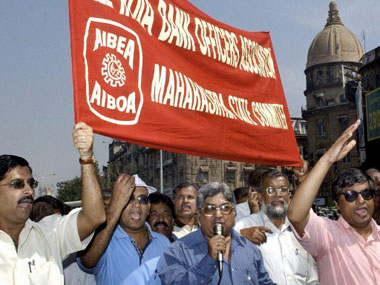A section of public sector bank employees have gone on nation-wide strike today to protest the Banking Laws (Amendment) Bill, partially affecting normal banking operations in some banks.
Employees of four bank unions participating in strike are from All India Bank Employees Association (AIBEA), Bank Employees Federation of India (BEFI), All India Bank Officers’ Association (AIBOA) and National Union of Bank Employees (NUBE).
But why would unions oppose the bill which is largely meant to benefit the public and instill more confidence among investors and depositors?
[caption id=“attachment_564604” align=“alignleft” width=“380”]
 Employees of four bank unions participating in strike are from All India Bank Employees Association (AIBEA), Bank Employees Federation of India (BEFI), All India Bank Officers’ Association (AIBOA) and National Union of Bank Employees (NUBE). AFP[/caption]
Employees of four bank unions participating in strike are from All India Bank Employees Association (AIBEA), Bank Employees Federation of India (BEFI), All India Bank Officers’ Association (AIBOA) and National Union of Bank Employees (NUBE). AFP[/caption]
The amendment to the banking laws will dilute the interest of public sector banks
and will facilitate the entry of corporates into banking by way of more mergers. Unions feel the entry of more private banks is detrimental as public money deposited in the banks can be misused for the benefit of few corporate honchos and not for the general public.
Moreover, the bill empowers the RBI to grant licences to corporate business houses to start their new banks.
Reliance and Religare are already gearing up for their banking foray even before the final guidelines are released by the RBI.
“The present generation of politicians must raise their voice in Parliament against the proposed amendments to the banking laws which are aimed at handing over Indian private sector banking to multinational banks and increasing the presence of Indian corporates and FDI in public sector banks,” D Vishwas Utagi, Secretary, The All-India Bank Employees’ Association is quoted as saying in the Hindu Business Line.
The Amendment Bill also contains provisions such as raising of shareholders’ voting rights from 10 percent to 26 percent in private banks and supersession of bank boards. They are opposed to the increase in voting rights to shareholders, as it may dilute the powers of the government in public sector banks.
It is because of these reasons that they have threatened to go on a day’s strike today.
In August, more than 10,000 bank employees held a mass meeting in Mumbai to protest against an amendment to the banking laws. Unions want banks to be government-owned as in the past people have lost money in the many private banks whose operations have been closed down by the central bank because of mismanagement.
The passage of the bill will be a giant step towards de-nationalisation of the PSU banks that have played a pivotal role in the growth of India’s economy, the unions had said in August.
)